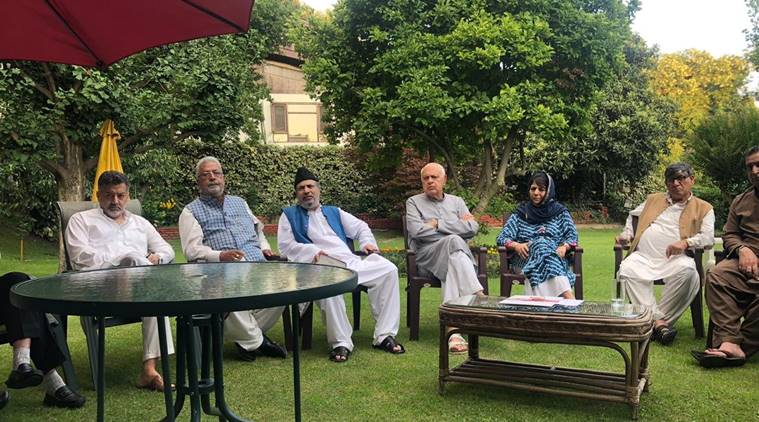


In a united front, legislators from various parties in Jammu and Kashmir, including the Awami Ittehad Party, Peoples Democratic Party, and J&K Peoples Conference, have moved a resolution against the Centre's decision to revoke Article 370 and 35A. They label the move as "unconstitutional and unilateral" and call for the immediate restoration of the articles in their original form, along with the reversal of changes introduced by the Jammu & Kashmir Reorganisation Act, 2019. The leaders urge the Union government to preserve the region's distinct identity, culture, and political autonomy, respecting its democratic and constitutional sanctity.
Revocation of Article 370 and Its Impact on Jammu and Kashmir: A Comprehensive Overview
Background
Article 370 of the Indian Constitution was a special provision that granted the state of Jammu and Kashmir a unique status within the Indian union. It allowed the state to have its own constitution, flag, and autonomous administration. The article was incorporated into the constitution in 1949, as part of the agreement between the Indian government and the state's leaders.
Revocation of Article 370
On August 5, 2019, the Indian government revoked Article 370 and Article 35A of the constitution, which gave special status to Jammu and Kashmir. The move was met with widespread protests and criticism, both within and outside the state.
The government's justification for the revocation was that it would help to integrate Jammu and Kashmir more fully into the Indian union, and to promote economic development and security in the state. However, critics argued that the move was unconstitutional and undemocratic, and that it would undermine the unique identity and autonomy of the state.
Impact on Jammu and Kashmir
The revocation of Article 370 has had a significant impact on Jammu and Kashmir. The state has been under a virtual lockdown since August 5, 2019, with restrictions on movement, communication, and assembly. Thousands of people have been arrested, and there have been reports of human rights violations.
The economic impact of the revocation has also been severe. The tourism industry has been decimated, and many businesses have been forced to close. Unemployment and poverty levels have increased, and the region is facing a humanitarian crisis.
Political Consequences
The revocation of Article 370 has also had a profound political impact. The move has deepened the alienation of the Kashmiri people, and has led to increased support for separatism. Several political parties in Jammu and Kashmir have condemned the move, and have called for the restoration of the state's special status.
The revocation has also strained relations between India and Pakistan. Pakistan has condemned the move, and has suspended diplomatic ties with India. The two countries have also exchanged fire across the border, raising fears of a wider conflict.
FAQs
1. Why was Article 370 revoked?
The Indian government's stated reason for revoking Article 370 was to integrate Jammu and Kashmir more fully into the Indian union, and to promote economic development and security in the state.
2. Is the revocation of Article 370 constitutional?
The legality of the revocation of Article 370 is currently being challenged in the Supreme Court of India. The court has yet to issue a ruling on the matter.
3. What has been the impact of the revocation on Jammu and Kashmir?
The revocation has had a devastating impact on Jammu and Kashmir. The state has been under a virtual lockdown since August 5, 2019, with restrictions on movement, communication, and assembly. Thousands of people have been arrested, and there have been reports of human rights violations. The economic impact has also been severe, with the tourism industry decimated and unemployment levels increasing.
4. What are the political consequences of the revocation?
The revocation has deepened the alienation of the Kashmiri people, and has led to increased support for separatism. Several political parties in Jammu and Kashmir have condemned the move, and have called for the restoration of the state's special status. The revocation has also strained relations between India and Pakistan.
5. What is the future of Jammu and Kashmir?
The future of Jammu and Kashmir is uncertain. The revocation of Article 370 has created a deep sense of grievance among the Kashmiri people, and it is unclear how the Indian government will reconcile these grievances with its goal of integrating the state more fully into the Indian union.

The Congress party declared a moral and legal triumph after the Delhi court dismissed the Enforcement Directorate's chargesheet in the National Herald-Young Indian case. The judge noted that the chargesheet was based on a private complaint rather than an FIR, making it legally inadmissible. The Congress accused the Modi government of maliciously targeting its leaders and misusing central agencies for political gain. They vowed to continue fighting for truth and democratic rights, asserting that nothing could deter them from their mission.

India commemorates Vijay Diwas every year on December 16 to honour the soldiers who sacrificed their lives during the 1971 war with Pakistan, which resulted in the creation of Bangladesh. As part of this year's celebrations, the Indian Army displayed a reconstructed Turkish armed drone, Yiiha, which was shot down by India during Operation Sindoor on May 10. The Kamikaze class of drones, also known as "suicide drones," were used by Pakistan to target Indian military and civilian installations, but were almost all destroyed by the Indian military.

India celebrates the 54th Vijay Diwas, honoring the bravery and sacrifice of its soldiers in the 1971 war that led to the liberation of Bangladesh. Political leaders, including Prime Minister Narendra Modi and President Droupadi Murmu, pay glowing tributes to the armed forces and their unmatched courage. The Army marks the occasion by recalling the historic triumph and the flawless coordination between different branches of the military, with an impressive Military Tattoo in Kolkata.

Renowned spiritual leader and former BJP MP, Ram Vilas Vedanti, passed away at the age of 67 due to a heart attack. Known for his significant role in the Ram Janmabhoomi movement, Vedanti had been admitted to a hospital in Rewa for a blood infection and low blood pressure. Attempts to transport him to a better medical facility were unsuccessful due to bad weather. Political leaders, including Uttar Pradesh Chief Minister Yogi Adityanath, expressed their condolences and praised Vedanti's contributions to society.

Indian Ambassador to the United Nations, Harish P, slammed Pakistan for misusing international platforms for its hostile agenda against India at the UNSC Open Debate on “Leadership for Peace”. He objected to Pakistan’s reference to Jammu and Kashmir and questioned its democratic credentials while reaffirming India’s stance on cross-border terrorism. This reflects the ongoing strain in India-Pakistan relations and New Delhi’s determination to counter any attempt by Islamabad to internationalise bilateral disputes.

As Delhi's air quality reached hazardous levels with an AQI of 500, the city saw 228 flight cancellations and over 400 diversions. In response, the regional government ordered all schools up to Class 5 to shift to online classes. The severity of the situation has also prompted advisories from the Singapore High Commission for its nationals living in Delhi and NCR to stay indoors and wear masks when going out.

A fierce gunfight broke out between security forces and terrorists in a remote village in Jammu and Kashmir, resulting in the death of a policeman and injuries to a terrorist. The encounter was based on specific intelligence inputs, and the terrorists are believed to be affiliated with the Pakistan-based Jaish-e-Mohammad outfit. Despite facing difficulties due to darkness and rough terrain, security forces continue efforts to neutralize the remaining terrorists as the operation has been suspended for the night and will resume at first light on Tuesday. With high alerts in place, the area has been cordoned off to prevent any further attempts by the terrorists to escape.

Controversy swirls around Bihar Chief Minister Nitish Kumar as a video goes viral of him attempting to remove the hijab of a Muslim woman doctor during an appointment letter distribution ceremony. The incident has been met with widespread outrage and criticism from opposition parties, with calls for Kumar's resignation. Shiv Sena UBT leader Priyanka Chaturvedi has also condemned the act, calling it a "public harassment." This incident raises concerns about safety and respect for women in the state of Bihar.

BJP National General Secretary Tarun Chugh expresses concern over the recent bomb threat emails that were sent to 11 schools in Jalandhar, Punjab. Chugh criticizes the AAP government for failing to control the spread of terror and creating a sense of panic among school children. This comes after a free eye medical camp was organized in Ongole, with MLA Damacharla Janardhana Rao emphasizing the consistent efforts of DJR Trust in serving the poor and underprivileged.

A controversy has erupted in Patna after a video went viral showing Bihar Chief Minister Nitish Kumar allegedly removing the headscarf of a woman AYUSH doctor during a government programme. The incident has drawn strong criticism from opposition parties like the Rashtriya Janata Dal and the Congress, with the latter calling for Kumar's immediate resignation. The CM's actions have raised concerns about women's safety in the state and have been deemed "shameful" and "disgusting" by political leaders. The event was organized to distribute appointment letters to newly recruited AYUSH doctors who will be deployed to improve healthcare delivery in Bihar.